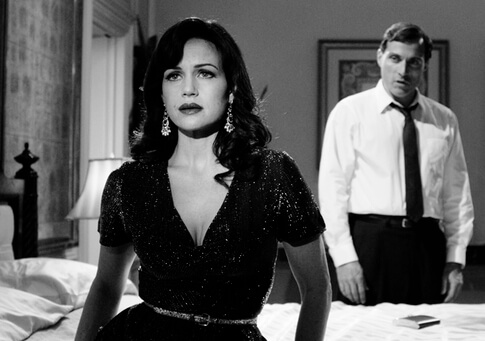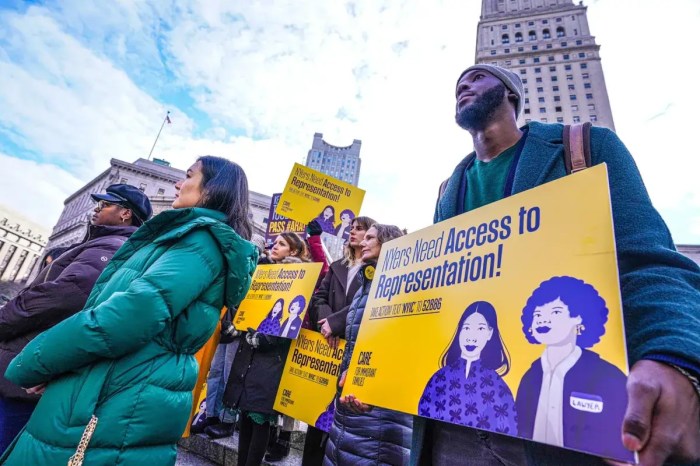Locomotive Entertainment
Unrated, 2 1/2 stars
A curious mix of parody and homage to film noir as simultaneously tense and tongue-in-cheek subversion of the vintage style of moviemaking, Hotel Noir conveys an affection rooted in both reverence and playful nostalgia. Which is to say that screwball and hardboiled make for rather surreal cinematic bedfellows.
Director Sebastian Gutierrez is no stranger to kooky screen collages blending serious tones with satire, in movies like Elektra Luxx and Women In Trouble. And Gutierrez goes devilishly retro this time around with Hotel Noir, as he toys with a multiplicity of elusive, unreliable narrators. And with quite an impressive collection of stars, all apparently willing to sign on as creative stimulus to wherever Gutierrez’s rather offbeat imagination may have in mind to take them.
Among the crowded roster of competing protagonists seemingly elbowing each other for attention, is Rufus Sewell as Felix. A rather despondent gumshoe holed up in an LA hotel in 1958, Felix harbors a couple of dark secrets, not to mention an attache case full of stolen mob money. As he does electronic surveillance with partner Logan (Robert Forster) on a chorus girl and former lover (Malin Akerman) referred to as high maintenance Swedish Mary. Who is actually an Italian from Milan, though maybe or maybe not.
At the same time, and in fact bookending Felix and his predicament at hand, is Eugene (Danny De Vito), a self-deprecating (‘I’m not what I expected to be’) installer of bathroom shower doors and moonlighting painter of house pets, at the moment checking into the hotel to type his memoir. Or possibly even the screenplay for this movie. And who shares customer tales of desperate housewives – and one in particular (Mandy Moore) – with well, plumbing issues of their own.
Also turning up is lounge singer Hanna Click (Carla Gugino), currently being stalked by her old flame, diminutive gangster Vance (Kevin Connolly). Though he ends up doing the hotel maid Sevilla (Rosario Dawson), because she happens to be making the rounds romantically to a number of the suites, dressed in a superhero costume. Which was given to her by Felix after she expressed enthusiastic admiration for the getup, when offering to hang it up to smooth out the wrinkles. But Sevilla sets her sights on Eugene as a soul mate instead, when the possibly suicidal scribe demonstrates appreciation for her as an intellectual hotel maid into Russian literature and opera.
Hotel Noir’s sensuous black and white visuals boast an abundance of eccentric characters out of time and place, and all wrapped up in a dreamy, booze-laced jazz score. And counting fabricators, freaks, femme fatales, tickling concubines, an unusually introspective bimbo pondering why her brain is ‘so boring,’ and existential anachronistic musings about being ‘the world’s forgotten girl with a heartful of napalm.’ Even if napalm is most commonly associated with the Vietnam war, but that may be the point.
And though the story could have been more focused with fewer punchlines, all that seems to be missing is the dame called toots (that’s what they were known as back then) perhaps remarking to her latest possible infatuation, Felix: Is that a Kalashnikov in your pocket, or are you just glad to see me.
LEAST AMONG SAINTS
Brainstorm Media
Rated R, 2 1/2 stars
A male bonding buddy movie linking generations, Least Among Saints pairs two emotionally wounded next door neighbors tackling demons from both without and within, and let’s just say ties up every loose end imaginable in the process. Which makes for a highly unlikely odd couple union, not just between the orphan kid in question and the alcoholic grownup who takes him under wing, but in a kind of cut and paste of a gritty indie with far fetched Hollywood fantasy as well.
Martin Papazian, who has put together an all purpose, virtually one man operation as writer, director and star of Least Among Saints, is Anthony Hayward, a combat soldier just returned from Afghanistan. Clearly moody and mentally troubled, Hayward rejects an offer from the military to help him readjust psychologically to civilian life. And then heads back directly to his now vacant childhood home in an Arizona burb, after remarking solemnly that he came from places he can’t pronounce, to return to nothing but divorce papers.
And it seems that his ex-wife and childhood sweetheart Jenny (Audrey Marie Anderson) has also taken out a restraining order against Hayward, though exactly why is never explained. And with no sense of a hopeful future in store, Hayward, following a run-in with the local police while driving under the influence, prepares to hang himself in his garage with a garden hose. But is interrupted by an altercation next door involving a junkie prostitute single mom (A.J. Cook) and her latest john. And after she ODs and departs for the afterlife the next day in rather rapid succession, Hayward at first reluctantly then adamantly takes her similarly disgruntled preteen son Wade (Tristan Lake Leabu) home as a kind of instant surrogate dad.
Which as you can imagine, does not sit well with the child welfare social worker Jolene (Laura San Giacomo). But who is likely to eventually bend every existing rule to make it happen, and essentially see the light. As will Hayward’s estranged wife, who may very well change her mind about him, though we’re never told why.
But none of these developments should come as a complete surprise, considering that why such young men’s lives should be destroyed by US military incursions abroad in the first place, is never a subject of discourse or scrutiny here. Hayward simply heals all the emotional damage that’s been done, in the course about forty minutes running time up to the credits. And in part with the kindly assistance of a police chief (Charles S. Dutton) who is willing to give Hayward a pass on multiple serious charges, including kidnapping twice.
Papazian, along with Leabu, excel in performances resonating with raw intensity and dramatic authenticity. And Papazian conceived of Least Among Saints while costarring in Sam Mendes’ war drama Jarhead, where he was earnestly inspired by the tragic circumstances facing US soldiers in war for real. Though the material forming the basis of Papazian’s film is strictly second hand, and unfortunately it shows.

































